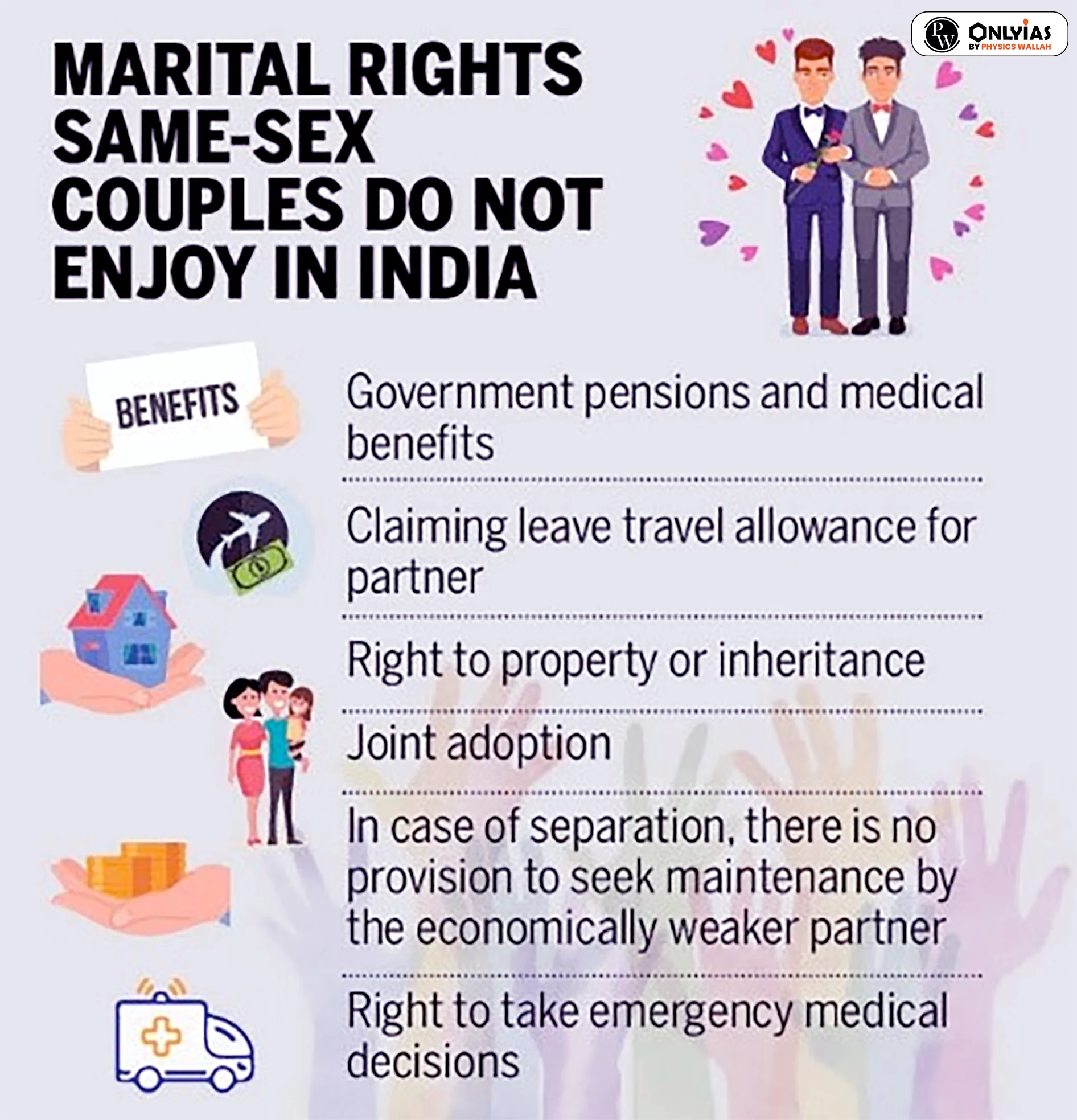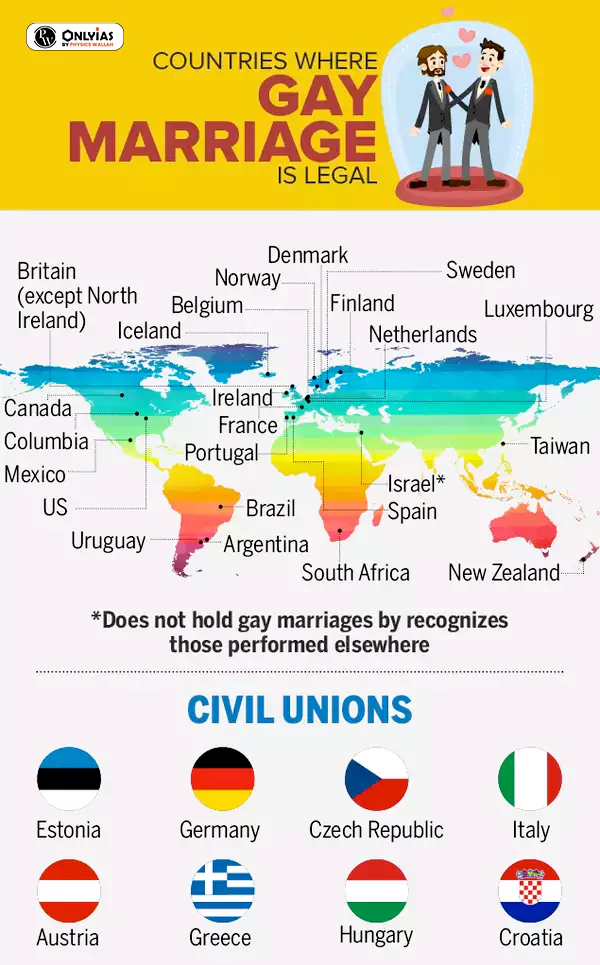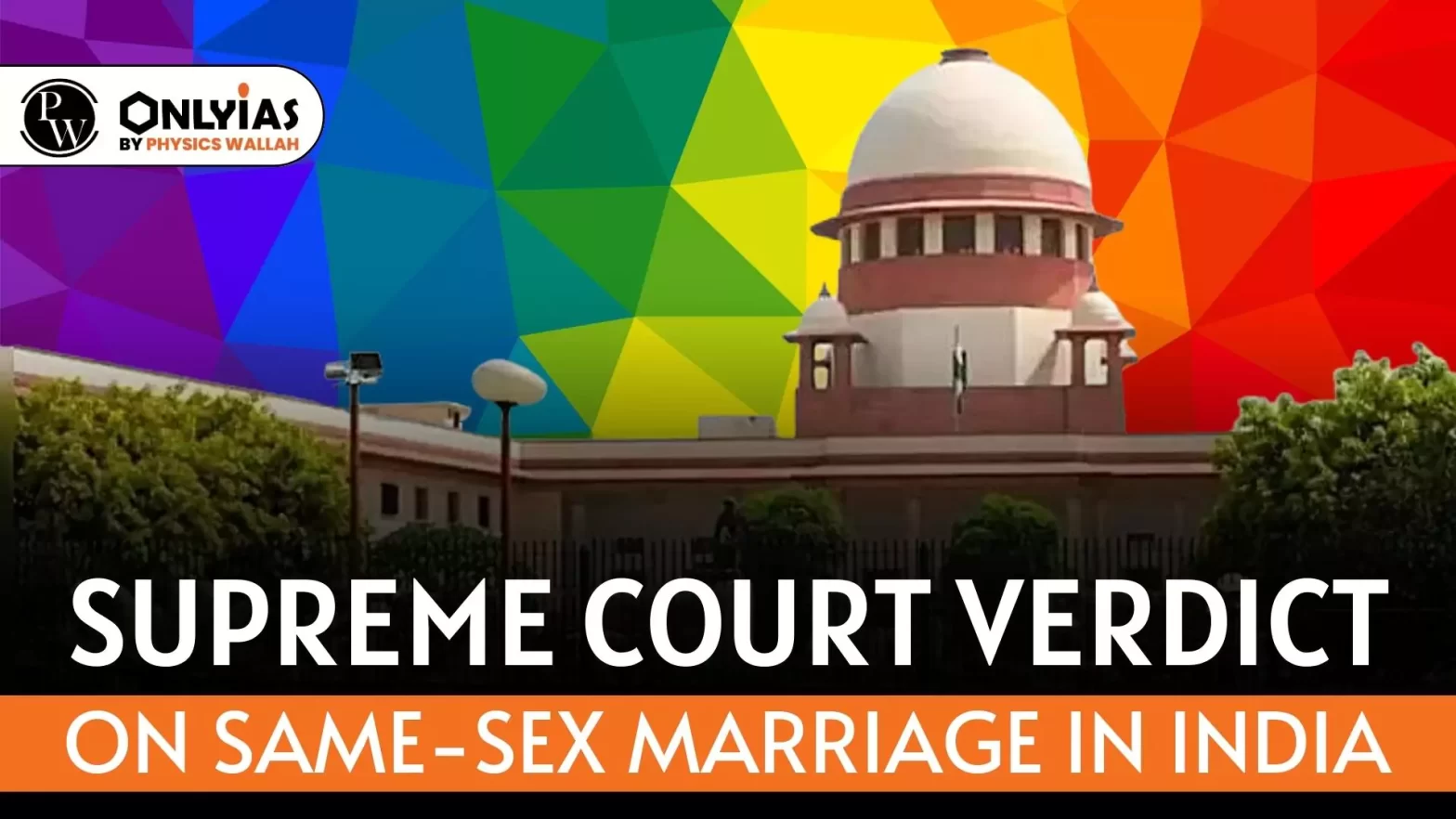Context:
| Relevancy for Prelims: Same Sex Marriage in India, Supreme Court, Special Marriage Act, Central Adoption Resource Authority (CARA), and LGBTQ+.
Relevancy for Mains: Supreme Court Verdict on Same Sex Marriage in India, LGBTQ+ rights, and Government’s stand on same sex marriage in India. |
Same Sex Marriage in India
- Same sex marriages refer to marriages between two individuals of the same gender. In India, same-sex marriages are not currently legal.

Timeline: How the case reached SC’s Constitution Bench
- November 25, 2022: Two gay couples filed petitions seeking recognition of same-sex marriage under the Special Marriage Act 1954.
- January 6, 2023: The Supreme Court allowed the transfer of all pending pleas seeking legal recognition for same sex marriages from high courts to itself.
- March 12, 2023: The Centre filed an affidavit opposing same-sex marriage, stating that the legislative understanding in India refers to marriage between a biological man and a woman.
- March 13, 2023: The Supreme Court referred the petitions to a five-judge Constitution Bench due to the matter’s “seminal importance” involving constitutional rights and legislative enactments.
- October 17, 2023: Supreme Court delivered a 3:2 verdict rejecting the legalization of same-sex marriage, emphasizing the matter to be dealt with by the legislature.
Same Sex Marriage in India; Supreme Court (SC) Verdict
| Key Questions |
Petitioners’ Argument |
Minority View of SC |
Majority View of SC |
| Fundamental Right to Marry |
- The Fundamental right to marry a person of choice exists under the Constitution.
- Recognition of this right imposes an obligation on the state to protect it
|
Marriage may not be fundamental in itself, but it gains significance through state regulation. |
Marriage’s fundamental importance lies in personal preference and social status. It being important doesn’t automatically make it an enforceable fundamental right. |
| Interpretation of Special Marriage Act (SMA) 1954.
SMA, 1954: It is an Act of the Parliament of India with provision for civil marriage for people of India and all Indian nationals in foreign countries, irrespective of religion |
- The Act discriminates between same sex and opposite-sex couples, denying same sex couples both legal rights and the social recognition and status that flows from marriage.
- Interpret SMA with a gender-neutral approach to allow same-sex couples.
- Alternative: Strike down gender-restrictive provisions.
|
Interpreting the SMA in a gender neutral way would amount to “judicial lawmaking”, which would violate the doctrine of separation of powers. |
SMA’s objective is not to include same-sex couples, hence, it cannot be interpreted to do so. |
| Queer Couples’ Right to Adopt.
Central Adoption Resource Authority (CARA):
- It is a statutory body of the Ministry of Women & Child Development.
- It functions as the nodal body for adopting Indian children.
|
- Discrimination in CARA guidelines against same-sex couples who cannot legally marry.
- CARA stipulated that only couples in a stable marital relationship for at least two years could adopt jointly.
- Additionally, single males were not allowed to adopt a girl child, while single females could adopt a child of any gender.
|
Struck down certain CARA regulations on the grounds that the legislation’s object is not to preclude unmarried couples from adopting a child. |
Agreed with the discriminatory aspect but stated legislative change is needed; Judicial change could have deleterious impacts. Parliament’s choice stems from other laws where protections and entitlements flow from the institution of marriage. |
| Civil Unions for Queer Couples.
Civil Union: It refers to the legal status allowing same-sex couples specific rights and responsibilities normally conferred upon married couples. |
- Civil unions are not an equal alternative to marriage and send a message of inferiority.
|
Recognized the right to form intimate associations within the fundamental right to freedom of speech and expression. Proposed setting up a committee to define rights available to queer couples in unions. |
Disagreed with prescribing a choice of civil unions. Advocated for the state to facilitate the choice for those who wish to exercise it. |
Also read: Marriage Registration Rules
LGBTQ+ rights developments in India
- Decriminalization of Homosexuality (2018)
- The Supreme Court abolished Section 377 of the Indian Penal Code, decriminalizing consensual same-sex relationships and ending the threat of prosecution.
- Legal Recognition of Transgender Rights
- The Supreme Court recognized transgender individuals as a third gender in 2014, advocating for their equal rights and protections.
- The Transgender Persons (Protection of Rights) Act was enacted in 2019, providing legal recognition and safeguarding the rights of transgender individuals.
- Same Sex Marriage
- Delhi High Court (2017) affirmed the right to marry as fundamental and underscored the denial of this right to same-sex couples as a violation. However, this was later deferred to the legislature by the Supreme Court.
Legality of Same Sex Marriage
- In Shafin Jahan v. Asokan K.M. and others 2018 Case: The SC held that the right to marry a person of one’s choice is integral to Article 21 of the Constitution.
- In Navtej Singh Johar and others v. Union of India 2018: The SC held that members of the LGBTQ community “are entitled, as all other citizens, to the full range of constitutional rights including the liberties protected by the Constitution and are entitled to equal citizenship and equal protection of law.
- Constitutionality of Same sex Marriages in India: The right to marry is not expressly recognized either as a fundamental or constitutional right under the Indian Constitution.
|
What are the arguments in favor of same sex marriage in India?
- Fundamental Rights and Equality
- Denying individuals the right to marry based on sexual orientation violates fundamental rights. Everyone should have the right to choose who they marry and enjoy the same legal benefits and protections.
- Marital Rights: Same sex couples do not enjoy Marital Rights.
- Marital rights are rights and benefits that a couple can exercise and enjoy upon marriage. Marital rights include the right to live with each other, maintain a physically intimate relationship and procreation.
- Promotion of Equality and Inclusivity
- Legalizing same sex marriage promotes equality inclusivity, and reduces discrimination against the LGBTQ+ community, fostering a more equitable society.
- Positive Impact on Mental Health
- Legalizing same sex marriage positively impacts the mental health and well-being of LGBTQ+ individuals, reducing discrimination and stigma they face, leading to a more accepting and tolerant society.
- Secularism and Democracy
- Legalizing same sex marriage aligns with India’s democratic principles and guarantees of equality and freedom to all citizens, irrespective of sexual orientation.
Also read: Why Restrict Single Women from Surrogacy: Delhi HC to Centre
What are the arguments against same sex marriage in India?
- Preservation of Traditional Definition of Marriage: Marriage is traditionally defined as a union between a man and a woman. Altering this definition undermines traditional family values and the institution of marriage.
- Procreation and Child Upbringing
- Opponents argue that the primary purpose of marriage is procreation and raising children, and same-sex couples cannot fulfill this purpose. They believe children need both a mother and a father for a well-rounded upbringing.
- Preservation of Cultural and Religious Traditions
- Same sex marriage is seen as inconsistent with Indian cultural and religious beliefs by opponents. They fear legalizing it would erode traditional values and contribute to the Westernization of Indian culture.
- Issues with Adoption of Children
- Adoption by queer couples in India can face societal stigma, harming both the child’s and parents’ well-being due to limited LGBTQIA+ acceptance.
- Gendered terms
- Argument that gendered terms like ‘mother’ and ‘father’, ‘husband’ and ‘wife’ would be problematic in same-sex marriages.
What is the government’s stand on same sex marriage in India?
- Centre had said that as per the law, marriage was permissible between a “biological man” and a “biological woman”.
- Same sex marriage is not recognized or accepted in any personal or statutory laws in India.
- Same-sex relationships and living together as partners are not comparable to the traditional Indian concept of a family unit consisting of a husband, wife, and children.
- Interference with existing marriage laws could disrupt the balance of personal laws in India and potentially create anomalies in the laws governing marriages of people of the Christian or Muslim faith.
|

Way Forward
- Advocacy and Awareness: LGBTQ+ organizations actively raise awareness about LGBTQ+ issues through rallies, protests, and campaigns, striving for greater rights and societal acceptance.
- Policy Reforms: Organizations like Naz Foundation and Humsafar Trust are at the forefront of policy and legal reforms, advocating for anti-discrimination laws, inclusive policies, and legal recognition of same sex relationships, including marriage.
- Counselling and Support: Various organizations offer crucial counseling and support services, aiding the LGBTQ+ community in addressing discrimination, bullying, mental health issues, and other challenges.
- Community Building: LGBTQ+ organizations play a vital role in fostering a sense of community and support by organizing events, social gatherings, and support groups to create safe and welcoming spaces for LGBTQ+ individuals.
Conclusion:
The Supreme Court’s recent unanimous verdict against legalizing same sex marriage in India underscores the ongoing struggle for LGBTQ+ rights, prompting a critical examination of fundamental rights, legislative enactments, and societal perspectives surrounding same sex marriage in the country.
| Prelims Question (2019)
Which Article of the Constitution of India safeguards one’s right to marry the person of one’s choice?
(a) Article 19
(b) Article 21
(c) Article 25
(d) Article 29
Ans: (b) |
| Mains Question (2021): Though the Human Rights Commissions have contributed immensely to the protection of human rights in India, yet they have failed to assert themselves against the mighty and powerful. Analysing their structural and practical limitations, suggest remedial measures. |
![]() 18 Oct 2023
18 Oct 2023


